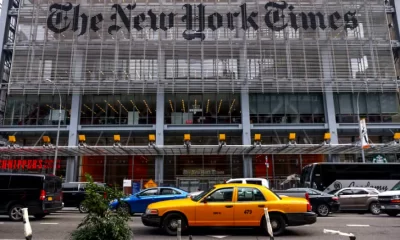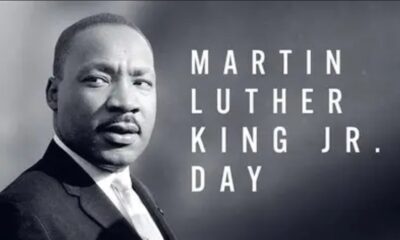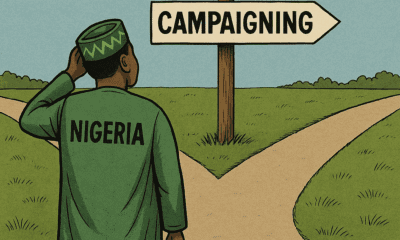National Issues
An Examination Of The Legal Regime For Consumer Protection In The Nigerian Aviation Industry -By Ifezie Christabel Ogechi
The rights available to air passengers are protected by various laws, and It is the duty of airline operators as well as airline agencies to ensure that the stipulated rights are strictly adhered to by parties. To this effect, air passengers should be properly educated on their legal rights and responsibilities, to generate sufficient awareness on the part of the consumer.

ABSTRACT
Air transportation is fast becoming the most popular means of transportation due to its safety and comfortability, earning consumers from all over the world and contributing immensely to the Nigerian economy. Where there is a manufacturer, producer or airline operator(s) in this case, and a consumer or air passenger, there is need for the interests of the consumer to be protected. The rights of a consumer to safety and comfort before, within and after the duration of the travel should at all times be fully enjoyed without interference. This study seeks to explain who a consumer is, give a concise analysis of the rights available to a consumer, limitations of rights of consumer, as well as the provide an overview of the legal framework regulating the aviation industry in Nigeria.
- INTRODUCTION
Transportation is the transfer, conveyance or movement of persons, animals, goods or services from one location to another.[1]The three most common modes of transportation in Nigeria include land, water and air transportation. Air transportation, as the name implies, is the movement or transfer of goods or persons by air from one place to another. The Aviation Industry is an important sector in Nigeria vital for economic development, which comprises many activities such as general aircraft maintenance, chartered and scheduled flights of passengers and freight, traffic regulation and control, to mention but a few. According to the National Bureau for Statistics, in 2019, the aviation industry contributed 0.14% to the nation’s Gross Domestic Profit (GDP), which was put at N198.62 billions.[2] This isapproximatelyN49.27 billion more than the N149.35 billion which was the revenue generated in 2018. The Nigerian Aviation Industry can be therefore, be regarded as a sector which contributes significantly to national socioeconomic development and GDP.
2.0. WHO IS A CONSUMER?
A consumer is a person who engages in the purchase and sale of goods and services. According to Black’s Law Dictionary,[3]a Consumer is one who purchase goods and services, for personal, family or household use. For the purpose of this paper, however, a consumer is someone who has engaged the services of an airline company by purchasing an airline flight ticket. Part 19.1.2.1 of the Nigerian Civil Authority Regulations (“NCAR”) defines a ‘Consumer’ to mean consumer of civil aviation services. Consumer Protection Laws are used to refer to a body or bodies of laws and regulations pertaining to the production of goods and actions producers must put in place to protect the consumers and ensure the safety of the latter. These laws ensures the safety of the consumers, i.e., that the goods or services paid for, fit the particular purpose for which it was contracted for ab initio; and prevents the consumers from been exploited or hoodwinked by mischievous producers. Breach of these rights would entitle to consumer to damages, and hold the producers liable to pay the states damages.
3.0. LEGAL REGIMEGOVERNING THE AVIATION INDUSTRY
The Nigerian Aviation Industry is governed by national legislation as well as international laws such as the Convention for the Unification of Certain Rules for International Carriage by Air (Montreal Convention) 1999, the Geneva Convention and the Cape Town Convention to which Nigeria is a signatory to. The Montreal Convention was recognized and ratified under our local law by Section 48(2) of the Civil Aviation (Repeal and Re-enactment) Act of 2006 pursuant to Section 12 of the 1999 Constitution of the Federal Republic of Nigeria.[4]In Nigeria, the apex protection agency for consumer rights is the Federal Competition and Consumer Protection Commission (FCCPC), which was established by Act No. 66 of 1992,[5] and commenced operations in 1999. The Constitution of the Federal Republic of Nigeria, 1999 places matters concerning aviation under the exclusive jurisdiction of the National Assembly, which enacted the principal legislation in the aviation industry: the Civil Aviation Act (CAA)[6] in 2006. Also, Section 251 of the 1999 CFRN vests on the Federal High Court, the exclusive jurisdiction to entertain matters relating to and bordering on Aviation. This was reiterated by the Courts in Otoakhia v. Aero Contractors Nigeria Limited.[7]
Some of the laws that govern the Nigerian aviation industry include:
3.1. CIVIL AVIATION (REPEAL AND RE-ENACTMENT) ACT OF 2006
The Civil Aviation Act (“CAA”) is the foremost legislation regulating aviation in Nigeria. Section 2(1) of the CAA establishes the Nigerian Civil Aviation Authority (“NCAA”) which is a body corporate with perpetual succession and common seal, and may sue and be sued in its own name. The NCAA is empowered with the duty of exercising control and coordinating the activities of the aviation industry, and regulating technical and safety issues (particularly issues relating to aircraft registration, airworthiness standards, aviation security and safety, personal licensing, to mention but a few)in the industry.[8]Section 30(1) of the CAA gives the NCAA the power to make provisions by regulations for carrying out the Convention on International Civil Aviation; for carrying out any other treaty in the field of civil aviation to which Nigeria is a party; and for regulating air navigation generally. Section 30(2) further states that the powers conferred on the NCAA shall, without prejudice to subsection (1), include power to make regulations for the registration of aircrafts, prohibition of flying aircrafts without an issuance of a certificate of airworthiness, alongside other circumstances provided for in section 30(2)(a –u) of the CAA.
The NCAA, in accordance with and pursuant to its regulatory authority under the CAA 2006, created the Nigerian Civil Aviation Authority Regulations (“NCAR”) in 2015 which addresses issues relating to aircraft marking and registration. Consumer Protection Regulation provided for in Part 19 of the Civil Aviation Regulations, 2015. This section established the Consumer Protection Department in March 2001 and charged the Department with the duty of educating, informing and protecting customers, and ensuring that passengers receive top-notch services during flights. Certain rights a passenger is entitled to when a flight already booked has been delayed are provided for in Part 19.6 of the Nigerian Civil Aviation Authority Regulations (NCAR) such as the right to be given reasons for the delay of an already booked flight within 30 minutes after the scheduled time,[9] right to after 3 hours of delay, to be refunded amount already paid,[10] etc, all which would be succinctly addressed in the course of this paper.
Furthermore, Part 19.2.1.1 of the NCAR specifies the persons to whom and circumstances where this Part shall apply. It states that this Part shall apply to passengers’ departure from an airport located:
- within Nigeria to another airport within Nigeria,
- in another country to an airport situated in Nigeria, unless they received compensation or benefits and were given assistance in that other country,
- on foreign air transportation with respect to flight segments originating at a point within Nigeria.
3.2. THE NIGERIA AIRSPACE MANAGEMENT ACT
The Nigerian Airspace Management Authority (NAMA), was established by the Nigerian Airspace Management Act of Parliament No. 48, with its commencement date on the 29th of May, 1999. It was established for the purpose of providing and regulating air traffic services, maintaining adequate communications at airports, preventing interference with aircraft’s operations, and ensuring security of air navigation safety…
3.3. THE FEDERAL AIRPORT AUTHORITY OF NIGERIA (FAAN) ACT
The Federal Airport Authority of Nigeria was enacted in 1999 and has its primary obligations explicitly set out in Part II of the Act. This legislation regulates the development and maintenance of airports, and provision of relevant services. Other responsibilities of the FAAN Act include: to provide sufficient circumstances for the carriage and transportation of passengers and freights, and the prohibition of goods which contravenes relevant sections of the Act; to prevent the pitching of items classified as dangerous by any regulation to the safety of air travel, to provide adequate security personnel and necessary resources, and even to prevent the use of an airport, although such prevention is subject to the express consent of the Minister for Transportation.[11]
4.0. AIRLINE PASSENGERS: RIGHTS OF A CONSUMER UNDER THE NIGERIAN CIVIL AUTHORITY REGULATIONS.
The rights of consumers (air passengers) are provided for in the Nigerian Civil Aviation Authority (NCAA) Act, 2006, and this legislation makes policies and regulations that protects consumers’ rights. Some of these rights include:
4.1. RIGHTTO SAFETY
This is the most important right of a passenger, as an air passenger’s safety is of paramount consideration during travel. Air passengers’ rights to safety have to be protected at all times because it is vital in the aviation sector where oftentimes, fundamental rights are disregarded. In March 2018, an Arik aircraft was reported to have been filled with smoke in an international flight from Nigeria to Ghana. It was also stated that there was no oxygen provided for passengers of the air travel; this put the safety of the passengers at risk and could have resulted in loss of lives of persons.[12] Every consumer’s right has to be considered and preemptive actions taken to prevent risking the lives of passengers in transit. Worthy of mention, is the fact that under the FCCPA, consumers/passengers had the right to enforce their legal rights in respect of services provided by airport operators. This is to the effect that various specified rights of consumers including right to safety, rights to timeous and adequate performance of services can be enforced by passengers in the case of breach.
4.2. RIGHTTO COMPENSATION FOR DELAYED, LOST OR DAMAGED BAGGAGE
Airlines owe a duty to the passengers to ensure that their baggage is protected from loss, theft or damage. This duty arises out of the contract which is believed to exist between an airline and a passenger or the owner of the cargo.[13] Should such baggage be lost, whether carried on the same flight or on different flights, the passenger would be entitled to compensation in accordance with the provisions of the Nigeria Civil Aviation Act.[14] For compensatory reasons, a passenger’s baggage would be deemed to be lost of after 7 days (for domestic flights) or 21 days (for international flights) from the date of scheduled flight, where no information has been provided to the passenger as to the whereabouts of such baggage. Thus, every passenger has the right to receive full service for the amount paid for, in this case, full compensation in the case of lost baggage.
4.3. RIGHTTO FULL VALUE FOR AIR PASSENGER’S MONEY
An air passenger is entitled to enjoy the services available and receive value for the amount paid. This is an integral part of the contract between the airline and the passenger(s), breach of which would result in liability on the part of the airline operators. In Cameroon Airlines v. Mr. Mike Otutuizu,[15] the court held that once a passenger obtains a ticket from an airline company, a contract is formed between them, and the rights accruable to the former ought to be duly given to him in all circumstances, failure of which results in damages to be paid by the latter.[16] In Kaydee Ventures Ltd v. Hon. Minister FCT,[17] it was held that where breach of contract is of a fundamental nature, the plaintiff deserves to be fully compensated. See also the cases of Emirate Airline v Aforka,[18]Emirate Airline v Mekwunye.[19]
Other rights available to a consumer (air passenger) include:[20]
The right to compensation for delayed, lost or damaged baggage;[21] right to compensation for flight cancellation, delays, and denied boarding for any reason other than technical, weather conditions, air traffic control restrictions, security risks and so on as provided in the NCAR;[22] right to seek redress for all irregularities during a flight;[23]right to timely feedback in respect of matters/complaints lodged with service providers; right to be fully informed about flight status; right to be treated with respect and dignity irrespective of race or physical condition, etc.
Worthy of note is the fact that notwithstanding the rights provided by legislation, as encapsulated above, there are certain restrictions provided by law in form of instructions to be strictly adhered to by the passenger for the protection of such person(s), some of which are: No passenger is permitted to act intentionally or negligently in a manner likely to constitute danger to the aircraft and other passengers; no passenger is allowed to smoke or be drunk in an airplane under any circumstances.
CONCLUSION
The rights available to air passengers are protected by various laws, and It is the duty of airline operators as well as airline agencies to ensure that the stipulated rights are strictly adhered to by parties. To this effect, air passengers should be properly educated on their legal rights and responsibilities, to generate sufficient awareness on the part of the consumer. There is further need to make the procedure for seeking legal remedy less cumbersome than it currently is, to encourage air passengers whose rights had been infringed upon receive the necessary remedy. Sanctions should be given to airline operators whose poor consumer services continue to erode on the rights of air passengers to serve as a detriment to other, and to this effect, airline regulatory agencies and airline operators are encouraged to buckle their seatbelts to make sure that the Nigerian aviation industry continues to be the Aviation Hub of Africa, and continues to contribute to the national economy.
[1]Available at https://en.m.wikipedia.org/wiki/Transport /> Accessed June 23, 2023.
[2]Nnolim Nnaji. (2021) Save Aviation Industry from Collapse <https://www.vanguardngr.com/2021/07/save-aviation-industry-from-collapse/>Accessed August 23, 2023.
[3](9th Edition, 2009).
[4]J. Money, U. Nwaokike and S. Juwah. (2022) Consumer Protection in the Aviation Industry: Liability of Airline Carriers Over Lost Baggage. Available athttps://www.mondaq.com/nigeria/aviation/1039932/consumer-protection-in-the-aviation-industry-liability-of-airline-carriers-over-lost-baggage> Accessed June 23, 2023.
[5] Now FCCPC Act Cap C25, LFN 2004.
[6] Repeal and Re-enactment Act, 2006 (“CAA 2006”)
[7](2014) LPELR-23319 (CA)
[8]Aviation Laws and Regulation in Nigeria. (2022) Available at https://iclg.com/practice-areas/aviation-laws-and-regulations/nigeria> Accessed June 23, 2023.
[9]NCAR 2015, part 19.6.1.1
[10]NCAR 2015, part 19.9.1.
[11]FAAN Act, s. 5.
[12]Olaniyi F. and Uche M. (2018)Regulatory Framework for Air Passenger Safety and Protection in Nigeria. <https://thenigerialawyer.com/regulatory-framework-for-air-passenger-safety-and-protection-in-nigeria/ Accessed August 23, 2023.
[13]Ibid
[14] Part 19.7.3. of the NCAR, 2015.
[15]Emirate Airline v Mekwunye(2014) LPELR22685(CA); and Harka Air Services v Keazor [2011] 13 NWLR (Pt. 1264) at pp. 320-364
[16]Montreal Convention 1999, Article 11.
[17] [2019] 7 NWLR (PT. 1192) 171.
[18][2015] 9 WLR (Pt. 1463) p. 80 at 89.
[19][2019] 9 NWLR (PT. 1677) 191.
[20]Olaniyi F. and Uche M. (2018). Regulatory Framework for Air Passenger Safety and Protection in Nigeria. Available at https://thenigerialawyer.com/regulatory-framework-for-air-passenger-safety-and-protection-in-nigeria/ Accessed June 23, 2023.
[21]NCAR 2015, part 19.18.1.1.
[22]NCAR 2015, part 19.6.1.
[23]NCAR 2015, part 19.12.1.










